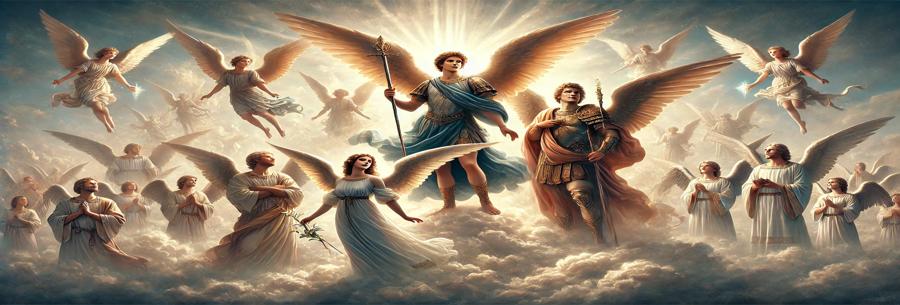Angels and archangels occupy a central place in Christian tradition, as well as in other monotheistic religions such as Judaism and Islam. Although the terms "angel" and "archangel" are often used interchangeably, they actually refer to two distinct categories of celestial beings with different roles in the divine plan. This text explores in depth the differences between angels and archangels, highlighting their hierarchy, their mission, and their specific role in the Christian faith.
Who are angels?
The word "angel" comes from the Greek angelos, meaning "messenger". In Christian theology, angels are spiritual creatures created by God to serve as intermediaries between Him and human beings. They have no physical body and are immortal. Their main mission is to glorify God and watch over humanity. Angels are mentioned in the Bible on several occasions, playing a variety of roles, from protection to communicating divine messages.
a) The nature of angels
Angels are purely spiritual beings, which means that they have no physical form, although they can sometimes appear to men in visible form. According to Christian tradition, they possess intelligence and will, but do not have free will like human beings. This means that angels are entirely devoted to God's will, and their actions are always in accordance with divine plans.
Angels are servants and worshippers of God. In the Book of Revelation, they are described as standing in the presence of God, singing his praises and glorifying him without ceasing (Revelation 5:11-12). They also intervene in human life, bringing messages, protecting individuals, and carrying out special missions for God.
b) The role of angels in the Bible
Angels appear throughout the Bible, playing vital roles at key moments in salvation history. For example:
In Genesis, angels appear to protect Lot and his family before the destruction of Sodom and Gomorrah (Genesis 19:1-22).
In Exodus, an angel of God leads the Israelites out of Egypt and protects them on their journey through the desert (Exodus 14:19).
In Luke's Gospel, angels announce the birth of Jesus to shepherds and praise God by singing, "Glory to God in the highest" (Luke 2:8-14).
These examples show that angels are not only messengers from God, but also protectors who watch over God's people.
c) The different orders of angels
Christian tradition, particularly through the writings of theologians such as St Thomas Aquinas and Pseudo-Denys the Areopagite, divides the angels into nine choirs or hierarchical orders, classified into three groups:
First group: The Seraphim, Cherubim, and Thrones, who are closest to God and devote themselves to his constant praise.
Second group: The Dominations, Virtues, and Powers, who carry out God's commands and watch over order in the universe.
Third group: The Principalities, Archangels, and Angels, who interact directly with humanity.
"Ordinary" angels belong to the last order and are those who interact most frequently with humans.
Who are the archangels?
Archangels, on the other hand, occupy a higher place in the angelic hierarchy. The term "archangel" means "chief of angels" (archi = chief, angelos = messenger). It therefore refers to angels who have a particular responsibility or mission within the spiritual world. Archangels are often sent by God to perform tasks of major importance in salvation history, such as protection, healing or announcing divine news.
a) Archangels in the Bible
Although the Bible mentions many angels, it only names three archangels specifically: Saint Michael, Saint Gabriel, and Saint Raphael. These three archangels have specific roles and are mentioned at key points in Scripture.
Saint Michael the Archangel: Michael, whose name means "Who is like God", is described as the leader of the heavenly armies. In the Book of Revelation (Revelation 12:7-9), he leads the angels in the battle against Satan and the forces of evil. Saint Michael is the protector of souls and the Church, and is invoked to defend against temptations and demonic influences.
Saint Gabriel the Archangel: Gabriel, whose name means "God is my strength", is known for his role as divine messenger. He is the one who announces to Mary that she will be the mother of Christ at the Annunciation (Luke 1:26-38) and informs Zacharias of the birth of John the Baptist (Luke 1:11-20). Gabriel is the bearer of important news and announcements in salvation history.
Saint Raphael Archangel: Raphael, whose name means "God heals", is the archangel of healing and travel. He is mentioned in the Book of Tobit, where he accompanies and protects young Tobias, while curing the blindness of his father Tobit (Tobit 5-12). Raphael is prayed to for physical and spiritual healing, as well as protection on journeys.
These three archangels play a special role in Christian theology, as they are sent by God on crucial missions, whether to proclaim, heal or protect.
b) The specific role of archangels
In contrast to ordinary angels who watch over individuals or bring more routine messages, archangels generally intervene at times of great spiritual importance. They have a leadership role in the angelic realm and are sent on specific large-scale missions.
Saint Michael is an archangel of spiritual protection. He fights evil and demonic forces and is often depicted with a sword, ready to defend the Church.
Saint Gabriel is the archangel of revelation, bringing divine messages to humans at key moments in salvation history.
Saint Raphael is the archangel of healing and travel. He ensures that those who are travelling or seeking healing are protected and restored.
3. Differences between angels and archangels
Although angels and archangels are both celestial beings created by God, there are several important distinctions between them.
a) Hierarchy and rank
Archangels are higher in the celestial hierarchy than ordinary angels. As mentioned earlier, archangels are part of the higher order of angels and have more important missions. They are often sent to carry out far-reaching tasks, while ordinary angels are responsible for looking after individuals or carrying out more specific day-to-day missions.
Archangels, as chief angels, sometimes lead armies of angels in carrying out God's will, such as Saint Michael in the heavenly battle against the forces of evil in Revelation.
b) Role and mission
Ordinary angels often play a role as protectors or messengers in the lives of individuals. They watch over human souls, guiding and protecting them. For example, in Christian theology, each person is considered to have a guardian angel who accompanies them throughout their lives.
Archangels, on the other hand, are messengers or agents of God sent on specific missions that affect the overall plan of salvation. For example, Gabriel is sent to announce the coming of Christ, while Raphael is sent to heal and protect.
c) Divine intervention
Archangels often intervene in situations where major decisions or events are taking place in God's plan for humanity. Their appearance usually marks a moment of great spiritual importance, such as Gabriel's Annunciation to Mary or Raphael's healing of Tobit. Angels, on the other hand, intervene more frequently in human affairs in more subtle ways, protecting, guiding and supporting souls on a daily basis.
Conclusion
In summary, although angels and archangels are both servants of God and heavenly messengers, they differ in rank, mission and role in the divine plan. Angels are protectors and spiritual guides, watching over individuals and helping them on their journey of faith, while archangels, higher up in the celestial hierarchy, are sent by God to carry out missions of the utmost importance. Their complementary role in the Christian faith highlights the way in which God uses these celestial beings to accomplish his will in the world and support humanity on its path to salvation.




















